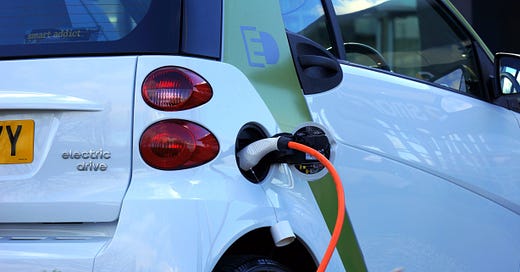Friday Nudge: A Reflection on Individual Climate Action
Individual action matters, but not for the reason that many people think
Hello friends. How are you doing? What has this week been like for you? If it has felt hard or like you’re ‘in the weeds', you aren’t alone. After I posted my sermon yesterday here on Substack, I heard from several people who have been finding this week tough. If that is you, you might enjoy this blog post from my friend, the Rev. Lynne Gardiner.
Welcome! I’m Jessica, and this newsletter is about faith and climate action. You can subscribe by clicking here:
“EVs are the only bright spot in climate fight, study shows”
That is the headline in a news article in the Ottawa Citizen this past week. The study claims that global efforts to reduce carbon emissions around the world have been going down, but that sales of electric vehicles (EVs) are booming. After analyzing various areas of the global economy, Bezos Earth Fund1 and other NGOs determined that EV sales are the only thing going in the right direction concerning the climate emergency. There are a few other areas of the economy moving in the direction of lower greenhouse gas emissions, but “they’re not moving fast enough.”2 According to the article, EV sales have grown from 1.6% in 2018 to 10% in 2022. That is definitely a quick rise in sales.
Want to support my work but not ready or able to subscribe yet? You can buy me a coffee! Click here:
Buying an EV is an individual consumer decision. We know, however, that without the fossil fuel industry itself going entirely off fossil fuels and either retooling for the renewable energy market or dying out, no amount of individual consumer decisions is going to move the needle on the rise in global heating. As well, we simply cannot replace every combustion engine on the roads right now with the electric engine and hope to reduce global heating. We are currently buying too many things and using too many Earth materials to ever find sustainability for people and the planet at our current rates of consumption.
What I see when I read this article is what is prevalent in mainstream society: The desire on the part of consumers to make a change. We care about the Earth (or the “environment” as though it is outside of us), and we are worried about the climate crisis. We have been told, through massive greenwashing marketing campaigns by the neoliberal capitalist system, that we are responsible, through our individual purchasing choices, for the climate emergency and ecological crisis, and for reducing global heating and “saving the planet.”
This simply isn’t true. No amount of individual action, on its own, is going to get us out of the climate crisis. No amount of individual action, on its own, is going to reverse the ecological crisis. While we are responsible through our consumption habits and these have to radically change, we exist within a wider system that accords power to the very few who are controlling and manipulating our desires and our sense of what we need to be happy and fulfilled. We exist within a wider system that has been built on a platform of colonialism, white supremacy, and belief in the human right to dominate the natural world. Climate justice will require a radical transformation in how we understand the world and ourselves, and thereby a radical transformation in our relationships with one another on every level; individual, social, and political. Locally, regionally, and globally.
I believe that the uptick in sales of EVs reflects the well-intentioned desire of individuals - primarily those in the Global North who are financially very well off - to try to make a positive change. However, such intention is misdirected. While we do need to get off of fossil fuels completely, and EVs are an important part of that, such changes alone won’t cut it.
Individual consumer action is important, but not for the reasons that the marketing industry claims.
Individual action is important when we use it for our character formation; to help us build the spiritual, ethical, and practical muscles for living in a different way from the norm.
Individual action is important when we use it for slowing down; to engage more closely with and within the Earth community.
Individual action is important when we use it to support and encourage us in taking wider social and political action; it becomes the foundation for the wider work.
Individual action is important when we use it to support others; and when we spend the dollars that we can to support local businesses, especially the small businesses that are trying a healthier model of business for both people and the planet.

What this short article suggests is that individuals - and again, in this case, the individuals who can actually afford an EV right now - are trying very much to help make the world a better place. But without a radical reduction in everything that we consume, particularly in the Global North (and rich people everywhere), and an entire transformation of the global economic system and its local variants away from fossil fuels and other greenhouse gas emitting practices, then all the EVs in the world is not going to matter. Not a whit.
I can’t afford an EV. In fact, as Lloyd Alter3 and Mike Berners-Lee4 have taught me, it is a smaller carbon impact for me to take care of my 14-year-old Honda Odyssey and drive it into the ground rather than replace it with a newer EV or hybrid vehicle. But what I can afford to do is spend my money on supporting small local businesses when I can. When I am able, for example, I have been buying fewer but better-made and sustainable clothing from Ottawa designer Rebecca Rowe and Toronto company Encircled. I am doing this for four reasons:
It helps me to live in line with my values, which builds up my character as a citizen and Christian;
It helps me to slow down because I cannot simply go out and buy the latest fashion on a whim;
It creates a stronger foundation beneath me as I take on greater social and political climate action; and
It helps me to support small businesses doing good work in the world.
I am not trying to put a downer on the efforts that people make in their individual lifestyle choices; far from it! The points above illustrate that individual climate action is vital in the fight against global heating; just not for the reason commonly believed and promoted in corporate greenwashing.
Ultimately, for people of faith our individual, as well as our social and political actions, can be our forms of discipleship. They can be, for us, some of the ways in which we respond to the call of God on our lives, and seek to live that call out in the world.
Be well, my friends. Yours in Earth community, Jessica
What kind of individual actions are you taking? How can they support you in taking social and political climate action?
Love what you read here and want more? Consider upgrading to a paid subscription. With a paid subscription you will receive insightful essays and inspiring sermons that explore the reality of the climate crisis in light of faith and the need for action. Every paid subscription makes it possible for me to fulfill my dream of building this work into a full-time ministry. Upgrade your subscription here:
I am not going to address the blazing contradiction that I identify between multi-billionaire Jeff Bezos, founder and former CEO of Amazon (and still its executive chairman) also being the founder of Bezos Earth Fund in this reflection! Suffice it to note it for now.
The article is originally on Bloomberg: https://www.bloomberg.com/news/articles/2023-11-14/is-the-world-doing-enough-on-climate-change-ahead-of-cop28?embedded-checkout=true. Accessed November 17, 2023.
Find Lloyd Alter’s book Living the 1.5 Degree Lifestyle: Why Individual Climate Action Matters More than Ever here: https://newsociety.com/books/l/living-the-1-5-degree-lifestyle. Accessed November 17, 2023.
The Carbon Footprint of Everything: https://greystonebooks.com/products/the-carbon-footprint-of-everything. Accessed November 17, 2023.






Thank you Jessica. Buying those EV’s do sometimes come from a good place but really we all need to go deeper in our analysis. The house of modernity has been built on extraction and consumption. Doing more of that is just going to devastate other ecosystems. We are repeating the mistakes of the past. This is hard for us to accept. Everything needs to change, but it begins with our relationship with Earth.